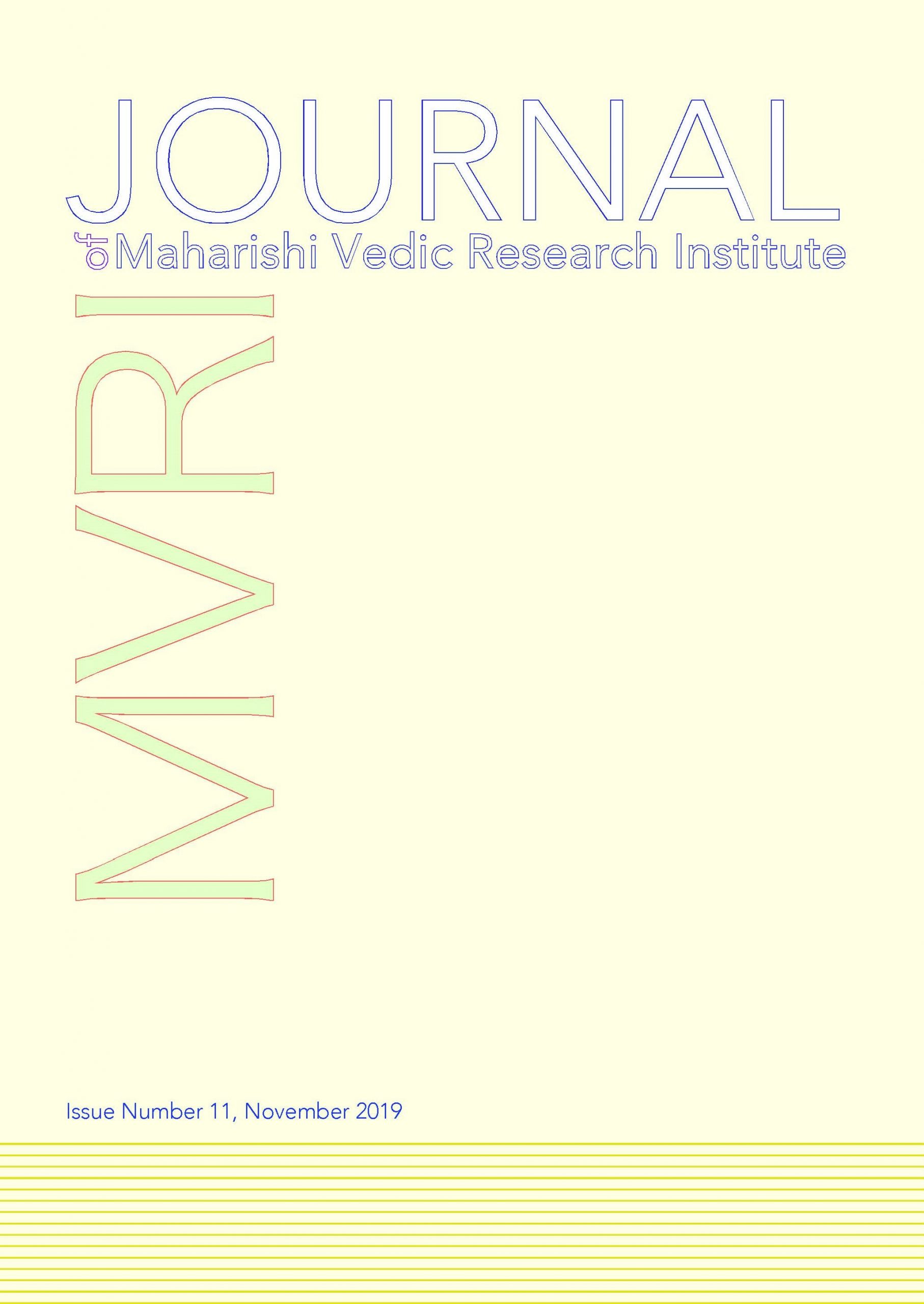JMVRI Issue Number 11
 JMVRI Issue Number Eleven is a themed issue focusing on psychology and mental health with papers on Vedic psychology and the Bhagavad-Gita; a personal case study of motherhood considering the nurturing of mothers through Maharishi Ayur-Veda, and Maharishi Ayur-Veda and its expertise in preventive medicine, promotion of ideal health, including mental health, and the development of higher states of consciousness.
JMVRI Issue Number Eleven is a themed issue focusing on psychology and mental health with papers on Vedic psychology and the Bhagavad-Gita; a personal case study of motherhood considering the nurturing of mothers through Maharishi Ayur-Veda, and Maharishi Ayur-Veda and its expertise in preventive medicine, promotion of ideal health, including mental health, and the development of higher states of consciousness.
JMVRI Paper 11.1
The Bhagavad-Gītā: A case study in Maharishi’s Vedic Psychology
Author: Michael Dillbeck
This paper can be downloaded via the following link:
https://www.academia.edu/41015098/The_Bhagavad-Gītā_A_Case_Study_in_Maharishis_Vedic_Psychology
Citation: Dillbeck, M. (2019). The Bhagavad-Gītā: A case study in Maharishi’s Vedic Psychology. Journal of Maharishi Vedic Research Institute, 11, 11-61.
Introduction
Maharishi Mahesh Yogi has described the many narrative accounts contained in the Vedic Literature as case studies in his Vedic Psychology. This article introduces the purpose of Vedic case studies and analyses the Bhagavad-Gītā as a model case study from the Vedic Literature. This case study provides knowledge of the full range of human development—from a state of complete ignorance, characterised by mistakes, suffering and mental ill-health, to the state of complete enlightenment characterised by unrestricted success and fulfillment. The case study is expressed in the form of an interaction between Lord Kṛishṇa and the warrior Arjuna who is seeking wisdom. The Bhagavad-Gītā points out that all forms of problems and suffering are due to lack of full integration of life, which in turn is due to individual consciousness not being fully established in the field of pure consciousness, identified by Maharishi as the unified field of Natural Law. The importance of both direct experience and intellectual understanding of the field of pure consciousness is emphasised by the Bhagavad-Gītā; the experience of pure consciousness is described as effortless and blissful. The Bhagavad-Gītā describes the experience of higher states of consciousness—stages of enlightenment—and identifies the quality of experience of these states. A description of the self-interacting dynamics of consciousness, at the basis of the creative process in nature, is also found in the Bhagavad-Gītā. The Bhagavad-Gītā thus contains the essence of Maharishi’s Vedic Psychology, expressed in a form that can be appreciated and applied by people of all walks of life.
JMVRI Paper 11.2
Nurturing Mothers through Maharishi Vedic Science: A Personal Account of Motherhood
Author: Natalie Delfiner
This paper can be downloaded via the following link:
Citation: Delfiner, N. (2019). Nurturing mothers through Maharishi Vedic Science: A personal account of motherhood. Journal of Maharishi Vedic Research Institute, 11, 63-99.
Introduction
The challenges facing new mothers are many and varied. According to the Department of Health of the Government of Western Australia (2019), these challenges can range from ‘baby blues’, adjustment problems, attachment problems, anxiety, depression, and postpartum psychosis (puerperal psychosis). This personal account of motherhood addresses these challenges and proposes a support program with the potential to nourish and empower the lives of new mothers. A focus of my account will be the knowledge of Maharishi Vedic Science, derived from the ancient Vedic tradition, with an investigation into how its practical application can benefit the mental health of new mothers. I will explore the importance of three interlinked areas of mental health—consciousness, Maharishi Ayur-Veda and community—and show how enlivening these vital aspects of life can provide a much-needed solution to the well-being and enjoyment of this most precious moment in life—the birth of a child.
JMVRI Paper 11.3
Maharishi Ayur-Veda and Mental Health
Author: Jim Brooks
This paper can be downloaded via the following link:
https://www.academia.edu/41015120/Maharishi_Ayur-Veda_and_Mental_Health
Citation: Brooks, J. (2019). Maharishi Ayur-Veda and mental health. Journal of Maharishi Vedic Research Institute, 11, 101-124.
Summary
Ayurveda is the world’s oldest existing system of traditional medicine, whose recorded history dates to the 5000-year old treatise Atharva-Veda. Maharishi Ayur-Veda, developed by Maharishi Mahesh Yogi, the founder of Transcendental Meditation, is a modern form of Ayurveda which restores the original knowledge and practice of Ayurveda lost and/or misunderstood due to years of foreign rule in India. What distinguishes Maharishi Ayur-Veda is its expertise in preventive medicine, promotion of ideal health, including mental health, and the development of higher states of consciousness. Also significant is the abundance of scientific research, more than 600 published studies conducted over 50 years, that verifies its effectiveness in clinical practice, some of which will be cited in this paper. Some of the main topics included in this article are: 1) Maharishi Ayur-Veda, as applied to the field of mental health, shifts the paradigm of mental health from a focus on treatment of symptoms to treating the whole person, which includes mind, emotions, body, and spirit; 2) discussion of safety, compatibility with conventional treatment, and contraindications; 3) scientific research on Maharishi Avur-Veda; and 4) the Ayurvedic approach to treating depression, anxiety, Attention Deficit Hyperactivity Disorder (ADHD), and addictions. The overall purpose of this paper is to educate and inspire mental health professionals to look more deeply into this novel system of health care, and hopefully take advantage of Maharishi Ayur-Veda training programs as a way of enhancing their current practices.

